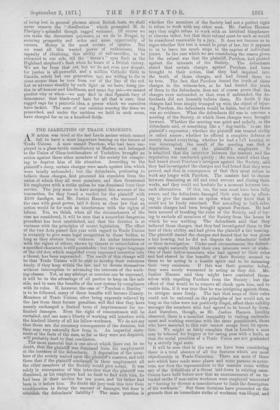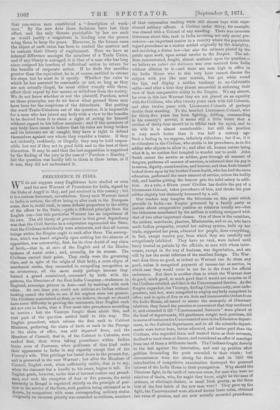THE LIABILITIES OF TRADE UNIONISTS.
AN action was tried at the last Leeds assizes which cannot fail to have a most important bearing on the future of Trade Unions. A man named Purchon, who had been em- ployed in a glass-bottle manufactory at Masbro, and belonged to the Union of Glass-bottlemakers of Yorkshire, brought an action against three other members of the society for conspir- ing to deprive him of his situation. According to the plaintiff's story, certain charges were made against him which were totally unfounded ; but the defendants, professing to believe these charges, first procured his expulsion from the union of which they all were members, and then threatened his employers with a strike unless he was dismissed from their service. The jury seem to have accepted this account of the transaction, for they found a verdict for the plaintiff with £300 damtges, and Mr. Justice Hannon, who summed up the case with great power, laid it down as clear law that an action would lie for such an interference with the rights of labour. Yet, we think, when all the circumstances of the case are considered, it will be seen that a somewhat dangerous precedent has been established, and that the decision is at variance with the principles of recent legislation. The effect of the two Acts passed this year with regard to Trade Unions is certainly to give some legal recognition to those bodies, so long as they abstain from violence. An undue interference with the rights of others, shown by threats or intimidation of a specified character, is still punishable ; but the vague language of the old Act, which magnified every expressed intention into a threat, has been superseded. The result of this change will be that Trade Unions will be able to develop their resources freely, if they keep within the law, and to devote themselves without interruption to advancing the interests of the work- ing-classes. Yet, as any attempt at coercion can be repressed, it will be to the advantage of all parties to keep on the safe side, and to earn the benefits of the new system by compliance with its rules. If, however, the case of "Purchon v. Hartley" is to be followed, many of these benefits will become illusory. Members of Trade Unions, after being expressly relieved by the law from their former penalties, will find that they have merely exchanged a limited term of imprisonment for un- limited damages. Even the right of remonstrance will be curtailed, and one man's liberty of working will interfere with the kindred liberty of all his fellow-workmen. We do not say that these are the necessary consequences of the decision, but they may very naturally flow from it. An impartial state- ment of the facts of the case, so far as they were not disputed, will probably lead to that conclusion,
The most material fact is one about which there can be no doubt, that the plaintiff was dismissed from his employment at the instance of the defendants. A deputation of the mem- bers of the society waited upon the plaintiff's masters, and told them that if the plaintiff continued in their employment all the other members of the Society would give notice. It was solely in consequence of this interview that the plaintiff was dismissed, as his employers had no fault to find with him, he had been in their service for ten years, and his father had been in it before him. No doubt the jury took this into their consideration in fixing the amount of damages, but does it establish the defendants' liability ? The main question is whether the members of the Society had not a perfect right to refuse to work with any other man. Mr. Justice Hannen says they might refuse to work with an habitual blasphemer or obscene talker, but that their refusal must be such as would be considered reasonable by a jury. It does not become us to argue whether this test is sound in point of law, but it appears to us to leave too much scope to the caprice of individual jurors. In the case which we are considering the reason given. for the refusal was that the plaintiff, Purchon, had plotted against the interests of the Society. The defendants stated that certain charges against Purchon had been brought to their notice, that they had inquired into the truth of those charges, and had found them to be true. The fact that Purchon denied the truth of these charges in the witness-box, as he had denied the truth of them to the defendants, does not of course prove that the charges were unfounded, or that, even if unfounded, the de- fendants did not honestly believe them. No doubt if the charges had been simply trumped up with the object of injur- ing Purchon, the defendants would be liable, but of this there was no evidence. What the defendants did was to convene a meeting of the Society, at which these charges were brought forward. Whether the meeting was quiet and orderly, as the defendants said, or something like a " dog-battle," to use the plaintiff's expression ; whether the plaintiff was treated civilly or called names ; whether he offered a complete defence or merely denied everything, whether he had a full hearing or was interrupted, the result of the meeting was that a deputation waited on the plaintiff's employers. It is admitted that the interview between the masters and the deputation was conducted quietly ; the men stated what they had heard about Purchon's intrigues against the Society, said. they had investigated the charges and had found that they were proved, and that in consequence of that they must refuse to work any longer with Purchon. The masters had to choose between dismissing an old and tried servant and closing their works, and they could not hesitate for a moment between two such alternatives. Of this, too, the men must have been fully aware, and the defendants damaged their own case by affect- ing to give the masters an option when they knew that it could not be freely exercised. But according to both sides, certain charges had been brought against Purchon. He had been accused of breaking the rules of the Society, and of try- ing to exclude all members of the Society from the house in which he was working. The defendants said that they believed those charges, that they had investigated them to the best of their ability, and had given the plaintiff a fair hearing. The plaintiff denied the charges and denied that he was given a fair hearing, but he did not dispute the defendants' belief or their investigation. Under such circumstances, the defend- ants might naturally think their own interests were at stake. One of their fellow-members, who had agreed to their rules and had shared in the benefits of their Society, seemed to them to be acting in a hostile spirit and to be menacing their very existence. If this was their genuine belief, they were surely warranted in acting as they did. Mr. Justice Hannen said they might have contented them- selves with expelling Purchon from the Society ; but the effect of that would be to remove all check upon him, and to enable him, if it was true that he was intriguing against them, to intrigue more freely. The fact that some of their rules could not be enforced on the principles of law would not, so long as the rules were not positively illegal, affect their validity amongst the members who had agreed to be bound by them. And therefore, though, as Mr. Justice Hannen forcibly observed, there is a manifest inequality in visiting embezzle- ment and working overtime with the same punishment, those who have assented to this rule cannot escape from its opera- tion. We might as fairly complain that in London a man may be tabooed for forgery or for eating peas with a knife, as that the social penalties of a Trade Union are not graduated by a strictly legal scale.
It will be seen that in the case we have been considering there is a total absence of all the features which are most objectionable in Trade-Unionism. There are none of those acts which have made some places and some persons so notor- ious, nor does the representation to the masters come within any of the definitions of a threat laid down in existing cases. Courts have held before now that an announcement of an in- tended strike if non-union workmen were employed -amounted.' to "forcing by threats a manufacturer to limit the description of his workmen." But those decisions have proceeded on the grounds that an immediate strike of workmen was illegal, and
that non-union men constituted a "description of work- men." By the new Acts these decisions have lost their effect, and the only threats punishable by law are such as would justify a magistrate in binding over the person using them to keep the peace. Moreover, in the former cases
the object of each union has been to control the masters and to restrain their liberty of employment. Here we have an internal difference amongst the members of a Trade Union, and if any liberty is outraged, it is that of a man who has long since resigned his freedom of individual action in return for the benefits of corporate action. If he finds the sacrifice greater than the equivalent, he is, of course, entitled to retrace his steps, bet he must do it openly. Whether the rules to which he has assented be reasonable or not, so long as they are not actually illegal, he must either comply with them, effect their repeal by fair means, or withdraw from the society. We do not know whether or not the plaintiff, Purehon, acted on these principles, nor do we know what ground there may have been for the suspicions of the defendants. But putting the word Trade-Unionism out of the question, it is impossible for a man who has joined any body with a view to the benefits to be derived from it to claim a right of acting for himself without regard to his fellow members ; and if the members of any body have cause to believe that its rules are being broken and its interests set at naught, they have a right to defend themselves against one whom they consider a traitor. If they act violently, recklessly, or illegally, they may be held respon- sible, but not if they act in good faith and to the best of their discretion. It may be said that the last supposition is negatived by the finding of the jury in the case of " Purchon v. Hartley," bat the question was hardly left to them in those terms, or if it was, they did not understand it.































 Previous page
Previous page